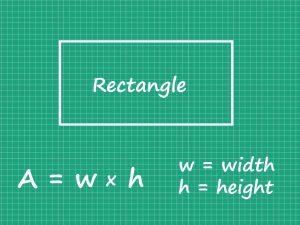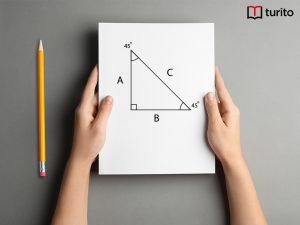Key Concepts
- Use an inverse tangent to find an angle measure.
Solve Right Triangles
To solve a right triangle means to find the measures of all of its sides and angles. You can solve a right triangle if you know either of the following:
- Two side lengths
- One side length and the measure of one acute angle

Inverse Trigonometric Ratios
Let ∠ A be an acute angle.
Inverse Tangent: If Tan A = x, then inverse tangent function tan–1 x = m∠ A.
Inverse Sine: If Sin A = y, then inverse sine function sin–1 y = m∠ A.
Inverse Cosine: If cos A = z, then inverse cosine function cos–1 z = m∠ A.

Use an inverse tangent to find an angle measure
Example 1:

Use a calculator to approximate the measure of ∠ A to the nearest tenth of a degree.
Solution:
Tan A = 16/20
=4/5
= 0.8
tan–1 0.8 = m ∠ A (Using a calculator)
tan–1 0.8 ≈ 38.65980825
So, the measure of ∠A is approximately 38.7°.
∠ A = 38.7°
Example 2:
Using inverse sines and cosines:

Use a calculator to approximate the measure of ∠A to the nearest tenth of a degree.
Solution:
Cos A = 6/10
m ∠ A = 53.1°
Example 3:
Solve the right triangle. Approximate angles to the nearest tenth of a degree and sides to two decimal places.

Solution:
Step 1: Find m ∠ p by using the Triangle Sum Theorem.
ÐP
180 – 90 – 37
mÐP = 53°
Step 2: Approximate PQ by using a sin ratio.
PQ
sin 37° = PQ/22
22 × sin 37° = PQ
13.24 = PQ
Step 3: Approximate QR using a cosine ratio.
QR
cos 37° = QR/22
22 × cos 37° = QR
17.57 = QR
Example 4:
At the circus, a person in the audience watches the high-wire routine. A 5-foot-6-inch-tall acrobat is standing on a platform that is 25 feet off the ground. How far is the audience member from the base of the platform, if the angle of elevation from the audience member’s line of sight to the top of the acrobat is 27°?

Solution:
Since QR is 25 feet and RS is 5 feet 6 inches or 5.5 feet, QS is 30.5 feet. Let x represent PQ.
tan 27° = QS/PQ (tan = opposite adjacent / opposite adjacent)
tan 27° = 30.5 / X (QS = 30.5, PQ = X)
X tan 27° =30.5° (Multiply both sides by X)
X = 30.5 / tan 27°
Divide both sides by tan 27°.
X ≈ 59.9 (Simplify)
The audience member is about 60 feet from the base of the platform.
Exercise
- Using inverse tangents.
Use a calculator to approximate the measure of ∠ A to the nearest tenth of a degree.

- Using inverse sines and cosines:
Use a calculator to approximate the measure of ∠ A to the nearest tenth of a degree.

- Solving right triangles:
Solve the right triangle. Round decimal answers to the nearest tenth.

- Let ∠ A be an acute angle in a right triangle. Approximate the measure of ∠ A to the nearest tenth of a degree.
sin A =0.5
- A soccer ball is placed 10 feet away from the goal, which is 8 feet high. You kick the ball and it hits the crossbar along the top of the goal. What is the angle of elevation of your kick?

- You are standing on a footbridge in a city park that is 12 feet high above a pond. You look down and see a duck in the water 7 feet away from the footbridge. What is the angle of depression? Explain your reasoning.
- Solve the right triangle. Round decimal answers to the nearest tenth.

- Find m∠ D to the nearest tenth of a degree if sin D = 0.54.
- Solve a right triangle that has a 40° angle and a 20-inch hypotenuse.
- Solve a right triangle

Concept Map

What have we learned
- Understand inverse trigonometric ratios.
- Understand inverse tangent , inverse sine, inverse cosine.
- Use an inverse tangent to find an angle measure
- Use an inverse sine and an inverse cosine
- Understand how to solve a right triangle.
- Solve a real-world problem.
Frequently asked questions
1. How to find the angle using inverse tangent if you have the opposite and adjacent sides?
Ans: Suppose the angle is A. So tan A=Opposite side/Adjacent side.
tan-1(opp.side/adj.side) = A
2. If sin x = ½ and cos x = 3–√3/2, find the value of x?
Ans: Given sin x = ½ and cos x =√3/2
Therefore tan x = sin x/cos x = 1/√3,
X = tan-1(1/√3) = 30o
3. If the Inverse tangnet function is tan-1(opp.side/adj.side) = A, what is Inverse cotangent function?
Ans: cot-1(adj.side/opp.side) = A
Related topics
Addition and Multiplication Using Counters & Bar-Diagrams
Introduction: We can find the solution to the word problem by solving it. Here, in this topic, we can use 3 methods to find the solution. 1. Add using counters 2. Use factors to get the product 3. Write equations to find the unknown. Addition Equation: 8+8+8 =? Multiplication equation: 3×8=? Example 1: Andrew has […]
Read More >>Dilation: Definitions, Characteristics, and Similarities
Understanding Dilation A dilation is a transformation that produces an image that is of the same shape and different sizes. Dilation that creates a larger image is called enlargement. Describing Dilation Dilation of Scale Factor 2 The following figure undergoes a dilation with a scale factor of 2 giving an image A’ (2, 4), B’ […]
Read More >>How to Write and Interpret Numerical Expressions?
Write numerical expressions What is the Meaning of Numerical Expression? A numerical expression is a combination of numbers and integers using basic operations such as addition, subtraction, multiplication, or division. The word PEMDAS stands for: P → Parentheses E → Exponents M → Multiplication D → Division A → Addition S → Subtraction Some examples […]
Read More >>System of Linear Inequalities and Equations
Introduction: Systems of Linear Inequalities: A system of linear inequalities is a set of two or more linear inequalities in the same variables. The following example illustrates this, y < x + 2…………..Inequality 1 y ≥ 2x − 1…………Inequality 2 Solution of a System of Linear Inequalities: A solution of a system of linear inequalities […]
Read More >>Other topics











Comments: